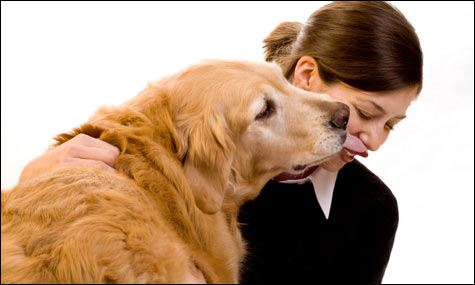
We’ve all heard the phrase, “You can’t teach an old dog new tricks.” However, it turns out that you can train an older dog. It may be harder to train an older dog than to train a young puppy, but older dogs are just as able to learn new things as other dogs.
Think about the way the human mind works. When we’re very young we can easily learn different languages. However, if we tried to learn Spanish or another language now, as adults, it might take years to learn.
The same thing is true with regard to dogs. When the brain learns something and it becomes fixed that way in the brain, it can take a lot of effort to replace it with some other way of doing something. However, it’s not impossible to learn something new. Not at all.
In some ways training an older dog can be slightly easier than training a younger dog. An older dog tends to be calmer. Older dogs can have less energy but they have attention spans that are longer than younger dogs have. Older dogs also already know a few things, like what the word “no” means. And, an older dog can tell when you’re unhappy or upset.
In the best case scenario, an older dog will also know that you are the leader of the pack. They shouldn’t have any problem accepting your leadership.
Your Older Dog and Training
Keeping these things in mind, you may have to test your older dog’s attention span, as well as your patience in order to teach them some new behaviors.
House Training — Most older dogs will already be house trained. However, if you are dealing with a rescued dog or an adopted dog that isn’t used to being inside a house, you may need to address house training issues. Older dogs will have a larger bladder than a puppy and be calmer, so house training should not be too difficult.
On the other hand, an older dog is coping with a strange place, people he doesn’t know, and a possible change in food. It can take some time for the dog to learn the basics. Take the older dog out often, especially at first. Make sure you praise the older dog when he goes outside.
Crate Training — It can be harder to crate train an older dog than a puppy, especially if your older dog has had any bad experiences with small spaces. Place your crate in a quiet area where there are fewer people walking thru.
Partially cover the crate with a towel or sheet and provide the older dog with toys and something soft to sleep on. Make sure you leave the crate door open. Allow the dog to find it on his own. Leave the door open so your dog can go in and out. Your dog should think of it as a bed and start using it on his own. The dog is basically crate training himself.
If the older dog doesn’t start using the crate on his own, you can help him adjust to using the crate by providing lots of extra attention when he is inside the crate.
Obedience Training — If you are planning some basic obedience training for your older dog, it may be a good idea to take a class. A good verbal and physical reward-based system will work well with an older dog.
It may sound like training an older dog is difficult but it’s not really any harder than training a puppy or young dog. It’s just different. Puppies are small and easy to control, but they are also antsy and easily distracted.
An older, full-grown dog usually listens with more attention and typically wants to please you. If you can use that and be patient with the dog, you will discover that it’s as easy to train an older dog as any dog you’ve ever encountered.
Until next time……
About the Author: Wayne Booth is owner of Canine Behavior Specialists in Nashville, TN. Wayne has been teaching people how to become Professional Dog Trainers since 1990 and he is the Training Director of Canine Behavior Specialists Network, www.K9-University.com










{ 1 trackback }
{ 1 comment… read it below or add one }
Having had ample experience in training dogs of all ages, I totally agree with Wayne when he claims that old dogs can learn new tricks. How much effort will be required entirely depends on the dog’s mental and physical health, his or her innate intelligent and the effectiveness of techniques used.
I have actually found that because older dogs are usually calmer, it is also easier to get them to focus on that which is being taught. Also, older dogs are more mature and therefore also more willing be guided toward a new behavior.
The key to training older dogs is to first establish a trusting bond and then be ready to praise and reward generously.
Leave a Comment